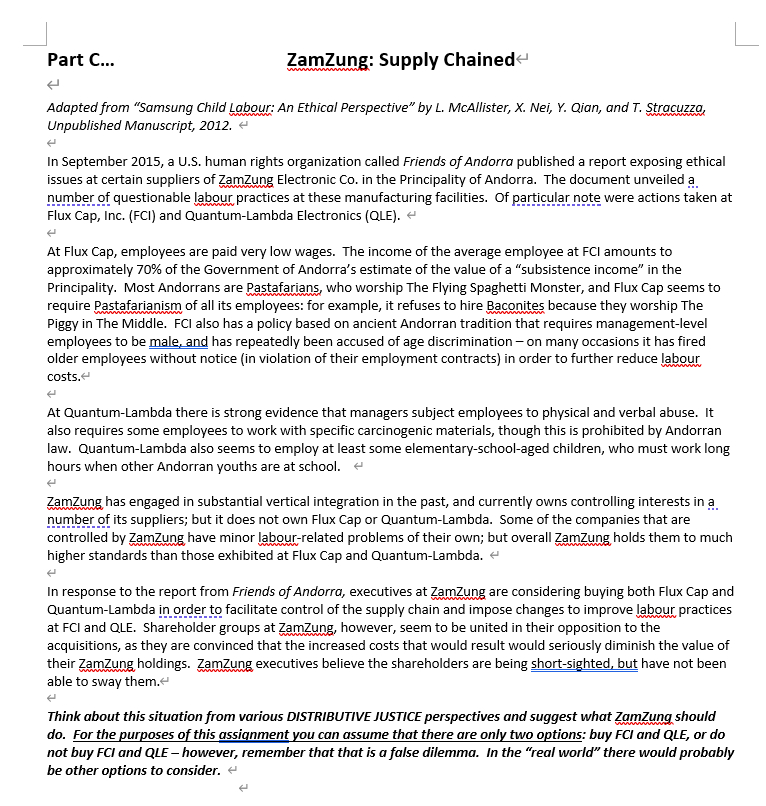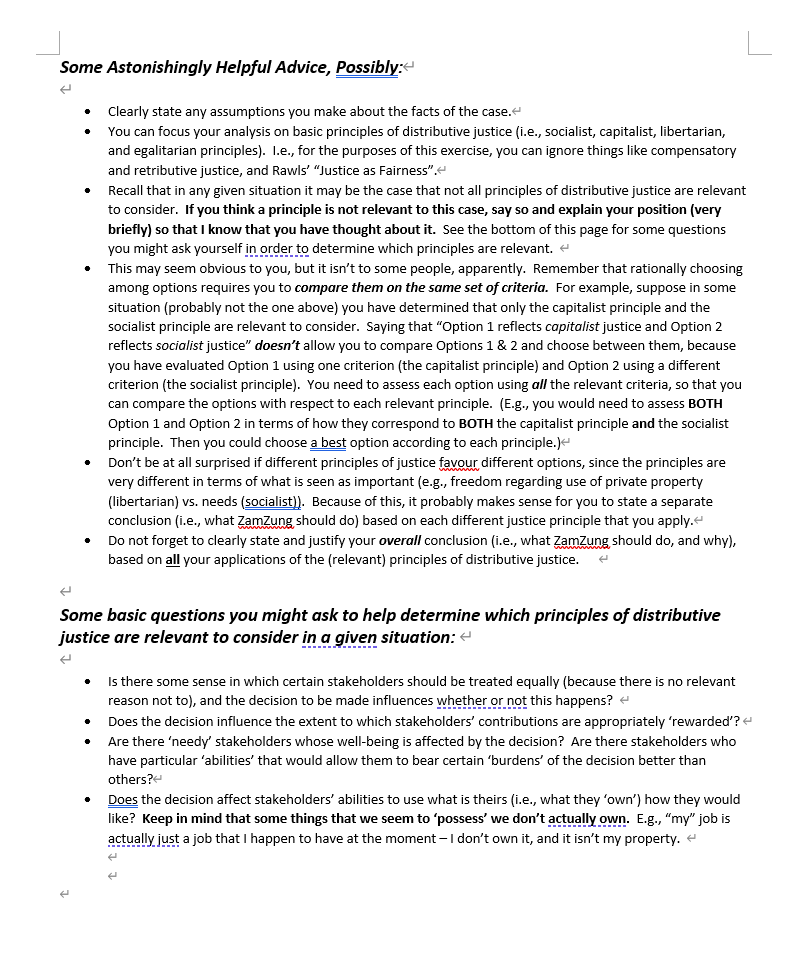Answered step by step
Verified Expert Solution
Question
1 Approved Answer
Part C... < ZamZung: Supply Chained wwwwwwwwww Adapted from Samsung Child Labour: An Ethical Perspective by L. McAllister, X. Nei, Y. Qian, and T.


Part C... < ZamZung: Supply Chained wwwwwwwwww Adapted from "Samsung Child Labour: An Ethical Perspective" by L. McAllister, X. Nei, Y. Qian, and T. Stracuzza, Unpublished Manuscript, 2012. < < In September 2015, a U.S. human rights organization called Friends of Andorra published a report exposing ethical issues at certain suppliers of ZamZung Electronic Co. in the Principality of Andorra. The document unveiled a number of questionable labour practices at these manufacturing facilities. Of particular note were actions taken at Flux Cap, Inc. (FCI) and Quantum-Lambda Electronics (QLE). < At Flux Cap, employees are paid very low wages. The income of the average employee at FCI amounts to approximately 70% of the Government of Andorra's estimate of the value of a "subsistence income" in the Principality. Most Andorrans are Pastafarians, who worship The Flying Spaghetti Monster, and Flux Cap seems to require Pastafarianism of all its employees: for example, it refuses to hire Baconites because they worship The Piggy in The Middle. FCI also has a policy based on ancient Andorran tradition that requires management-level employees to be male, and has repeatedly been accused of age discrimination - on many occasions it has fired older employees without notice (in violation of their employment contracts) in order to further reduce labour costs. < < At Quantum-Lambda there is strong evidence that managers subject employees to physical and verbal abuse. It also requires some employees to work with specific carcinogenic materials, though this is prohibited by Andorran law. Quantum-Lambda also seems to employ at least some elementary-school-aged children, who must work long hours when other Andorran youths are at school. < ZamZung has engaged in substantial vertical integration in the past, and currently owns controlling interests in a number of its suppliers; but it does not own Flux Cap or Quantum-Lambda. Some of the companies that are controlled by ZamZung have minor labour-related problems of their own; but overall ZamZung holds them to much higher standards than those exhibited at Flux Cap and Quantum-Lambda. < In response to the report from Friends of Andorra, executives at ZamZung are considering buying both Flux Cap and Quantum-Lambda in order to facilitate control of the supply chain and impose changes to improve labour practices at FCI and QLE. Shareholder groups at ZamZung, however, seem to be united in their opposition to the acquisitions, as they are convinced that the increased costs that would result would seriously diminish the value of their ZamZung holdings. ZamZung executives believe the shareholders are being short-sighted, but have not been able to sway them. < < Think about this situation from various DISTRIBUTIVE JUSTICE perspectives and suggest what ZamZung should do. For the purposes of this assignment you can assume that there are only two options: buy FCI and QLE, or do not buy FCI and QLE- however, remember that that is a false dilemma. In the "real world" there would probably be other options to consider. Some Astonishingly Helpful Advice, Possibly: < Clearly state any assumptions you make about the facts of the case. < You can focus your analysis on basic principles of distributive justice (i.e., socialist, capitalist, libertarian, and egalitarian principles). I.e., for the purposes of this exercise, you can ignore things like compensatory and retributive justice, and Rawls" "Justice as Fairness". Recall that in any given situation it may be the case that not all principles of distributive justice are relevant to consider. If you think a principle is not relevant to this case, say so and explain your position (very briefly) so that I know that you have thought about it. See the bottom of this page for some questions you might ask yourself in order to determine which principles are relevant. < This may seem obvious to you, but it isn't to some people, apparently. Remember that rationally choosing among options requires you to compare them on the same set of criteria. For example, suppose in some situation (probably not the one above) you have determined that only the capitalist principle and the socialist principle are relevant to consider. Saying that "Option 1 reflects capitalist justice and Option 2 reflects socialist justice" doesn't allow you to compare Options 1 & 2 and choose between them, because you have evaluated Option 1 using one criterion (the capitalist principle) and Option 2 using a different criterion (the socialist principle). You need to assess each option using all the relevant criteria, so that you can compare the options with respect to each relevant principle. (E.g., you would need to assess BOTH Option 1 and Option 2 in terms of how they correspond to BOTH the capitalist principle and the socialist principle. Then you could choose a best option according to each principle.) < Don't be at all surprised if different principles of justice favour different options, since the principles are very different in terms of what is seen as important (e.g., freedom regarding use of private property (libertarian) vs. needs (socialist)). Because of this, it probably makes sense for you to state a separate conclusion (i.e., what ZamZung should do) based on each different justice principle that you apply. Do not forget to clearly state and justify your overall conclusion (i.e., what ZamZung should do, and why), based on all your applications of the (relevant) principles of distributive justice. Some basic questions you might ask to help determine which principles of distributive justice are relevant to consider in a given situation: Is there some sense in which certain stakeholders should be treated equally (because there is no relevant reason not to), and the decision to be made influences whether or not this happens? Does the decision influence the extent to which stakeholders' contributions are appropriately 'rewarded'? Are there 'needy' stakeholders whose well-being is affected by the decision? Are there stakeholders who have particular 'abilities' that would allow them to bear certain 'burdens' of the decision better than others? Does the decision affect stakeholders' abilities to use what is theirs (i.e., what they 'own') how they would like? Keep in mind that some things that we seem to 'possess' we don't actually own. E.g., "my" job is actually just a job that I happen to have at the moment - I don't own it, and it isn't my property.
Step by Step Solution
There are 3 Steps involved in it
Step: 1

Get Instant Access to Expert-Tailored Solutions
See step-by-step solutions with expert insights and AI powered tools for academic success
Step: 2

Step: 3

Ace Your Homework with AI
Get the answers you need in no time with our AI-driven, step-by-step assistance
Get Started


